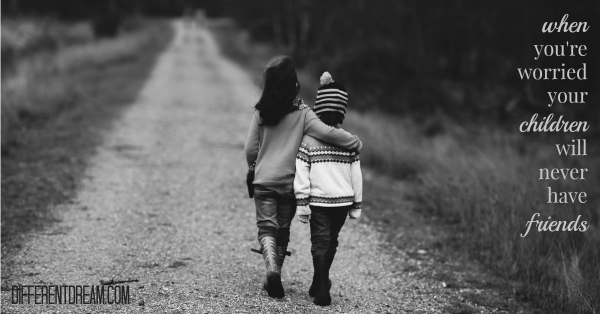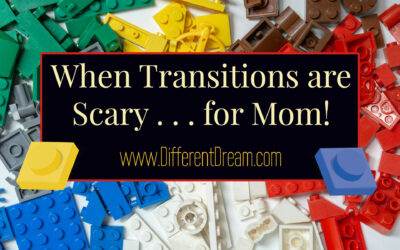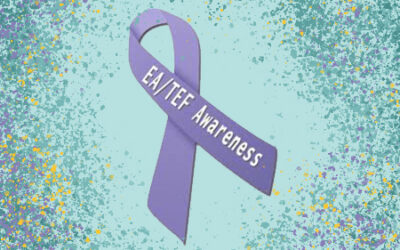When You’re Worried Your Child Will Never Have Friends

When I talk to parents, one of their biggest heartaches concerning their kids with special needs is a lack of friends. They see their children isolated from kids who don’t know how to look beyond a child’s special need and find a friend. Laurie Wallin addresses the issue in today’s post and provides four tips for parents who want to foster a climate of friendship for their kids.
When You’re Worried Your Child Will Never Have Friends
by Laurie Wallin
“Hi Susan, I was wondering if N—- can come stay at your house for a few hours after school next Friday? I’m headed out of town and my husband’s working until the evening. I’d love to spring for pizza for the girls for dinner. Would that work?”
Silence.
Awkward deep-thinking noises.
“I’ll have to see if that works for us. I’ll let you know.”
Days and days pass with no response from her. With each day I crawl deeper and deeper into an emotional hole. You see, my oldest girl—my creative, moody 10-year-old with bipolar and developmental delays—has never been a friend magnet.
It was only when I could not find one “friend” for her to stay with—for even a few short hours—that I realized she was, in fact, a friend repellant. A problem that was one part functional (after all, how much time do we have to socialize outside weekly therapy, groups, and medical appointments for her and her sisters??) and one part exhaustion (from my aversion to trying new things with a child who likes change as much as she likes brussel sprouts).
Our child’s developmental delays and other challenges can keep us up at night and make schedules and IEP meetings tense. They can also wreak havoc on the friendships our kids’ need to live and grow. Perhaps you’ve seen this too?
The brutal realization that I had no casual “I’ll watch your kids and you watch mine” friends or neighbors led me to create a plan of action to give my girl a better shot at a social life.
- Invested in counseling. Already a part of her symptom management tools, we set aside a few months for intentional, specific work on how to find, be, and keep a friend. Here, she works on catching and managing her mood swings, communicating her feelings without the Tourettes-ish behaviors that send peers running in confusion, and developing a less black-and-white view of others’ words and actions.
- Connected her with a relationship-building group at school. This became a line item on her IEP. Here, she meets with a group of kids who struggle with friendship at various levels so they can all learn and practice together. Having those kids on campus with her allows practice even when they’re not in the counselor’s structured environment and adds an element of social safety in the lunchroom and on the playground.
- Enlisted our closest friends for play dates. I made plans to meet with friends of mine who have wide-ranging ages of children. Since my daughter has known these families a long while, it’s more comfortable than making play dates with families from school. Learning to lead, co-mingle, and follow children of all ages is helping her learn how to find a place in a social situation that works well for her AND the other kids.
- Joined a Girl Scout troop. We’ve never been a part of a social extra curricular activity as a family because it seemed overwhelming to engage in a small group where other parents I barely know interact with my daughter and me in situations that may set her off (a.k.a. frustrate and embarrass her and me). As I’ve invested in the troop through teaching life-skills and confidence-building lessons, I’ve seen up close the growing skills my daughter’s learning. She’s doing so well in that small, highly structured environment and every meeting gives her a small win that builds her confidence to invest in friendships in other areas she’s involved.
As we move through all these experiences, I’m growing in confidence too. It’s showing us both that we can move past something that feels completely overwhelming, and I know that’s going to serve us well as she moves farther along into her tween and teen years.
What challenges have you faced lately when it comes to your child’s peers and relationships? How are you working through them?
Leave a Comment
How do help your child develop friendship? Some parent is waiting to hear your suggestions, so leave a comment.
Do you like what you see at DifferentDream.com? You can receive more great content by subscribing to the quarterly Different Dream newsletter and signing up for the daily RSS feed delivered to your email inbox. You can sign up for the first in the pop up box and the second at the bottom of this page.
By Laurie Wallin
Laurie is the mom of four daughters–two adopted with developmental delays, mood disorders, and ADHD. A former junior high teacher turned speaker and life coach, she loves to learn, laugh until their sides hurt, and help women be courageous in life.
5 Comments
Submit a Comment
Subscribe for Updates from Jolene
Related Posts
How Do I Let Go of My Adult EA/TEF Child?
Valeria Conshafter explores the question “How do I let go of my adult EA/TEF child?” for EA/TEF Awareness Month.
How Can an EA/TEF Parent’s Anxiety Be Held in Check Before their Child Starts School?
Karena Skibinski shares her answers to the question: How can an EA/TEF parent’s anxiety be held in check before their child starts school?
Ringing in the New Year with EA/TEF Awareness Month
Jolene Philo is ringing in the New Year with EA/TEF Awareness Month for the fifteenth year at Different Dream.






Thanks for sharing these great tips, Laurie!
Hi Michelle,
I’m so glad the post helped you. Laurie had some wonderful, practical ideas didn’t she? Come back and report on how the Girl Scout situation works for your family.
Jolene
A very big issue that many of us deal with on a daily basis and that can have heartbreaking affect on us and our kids. Thank you for offering these wonderful tips. The idea for a school based group (to be included on IEP) is awesome and something that I would not have thought of. I am going to look into Girl Scouts! Thank you, thank you, thank you!
Thanks for sharing, Laurie. We’re facing these very struggles right now with my daughter (8) so I love how you broke it down into a plan of action–specifically how you listed the relationship-building group on the IEP; great idea! It’s hard to see her isolated right now, but hopefully over time that will improve…
Thanks again,
Rachel
Hi Jolene, you have no idea how perfect the timing is for this! I’m sharing on Moms Together tomorrow about forging friendships as moms, and I’ll share this link too!